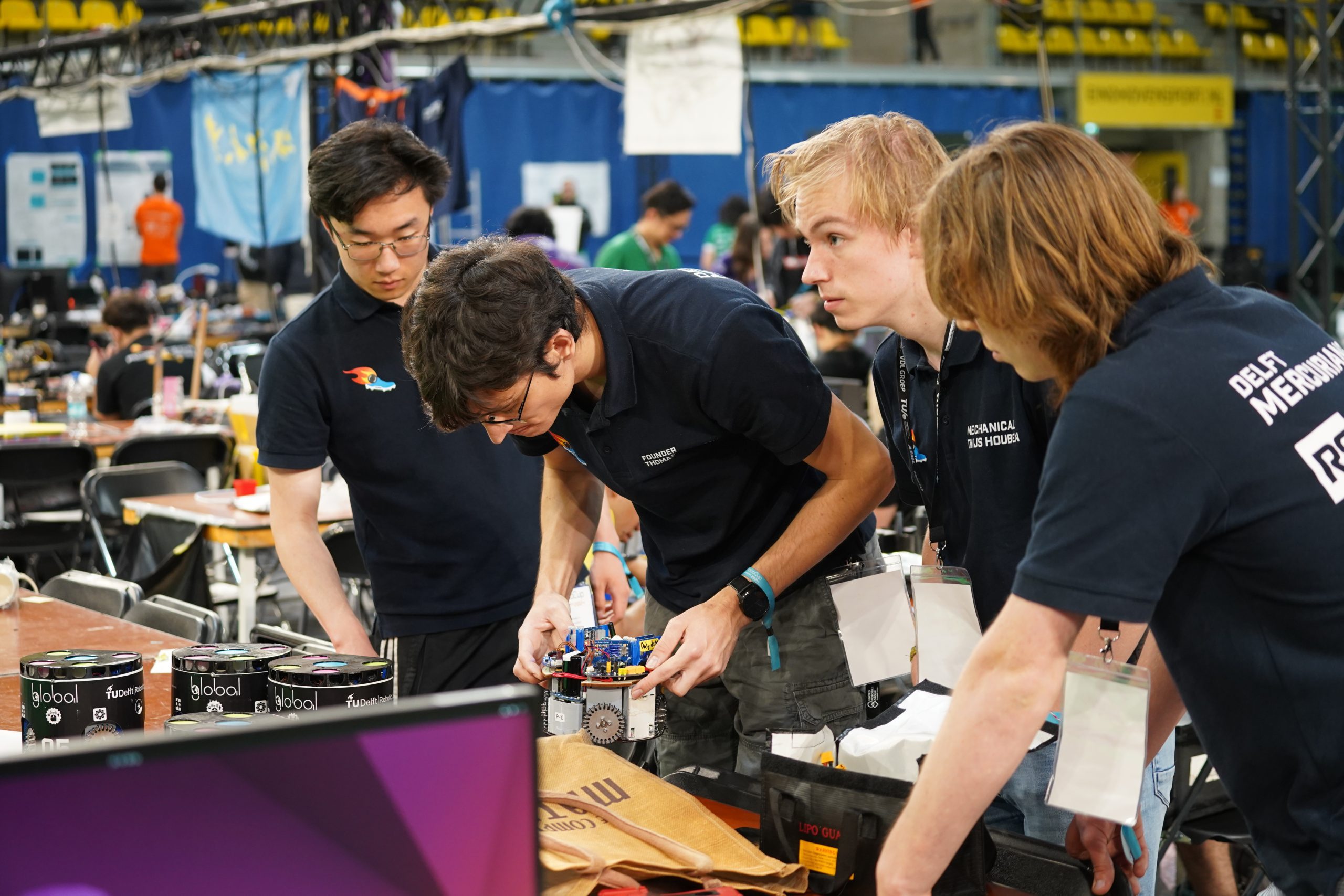Team captain Zhenglang Lu is proud of his robot football team, the Delft Mercurians. Even though they are a new team, they won two games. “This hasn’t happened for years,” says Lu who is looking for new team members.
Emergency repair of one of the robots during the competition. (Photo: Delft Mercurians)
After only two years, the Delft Mercurians, the new TU Delft robot football team, entered the Robocup Eindhoven 2024 world championship. Three hundred teams from 45 countries competed, and the event drew more than 50,000 visitors over four days.
“The energy in the stadium was addictive,” says Robotics master student and team manager Zhenglang (‘Steven’) Lu. Held at the end of July in a sports hall without air conditioning, the conditions were hot and tiring. But the buzz and excitement of competing in this world class event helped the team forget about the heat.
A part-time student team membership is attractive for international students
Most student teams have a completely new crew every year, consisting of students who devote one year of their study to the team experience. In contrast, the Delft Mercurians is a part-time team whose crew members often stay longer than one year. Lu estimates that working on developing and improving football robots takes about eight hours a week. A part-time student team membership is attractive for international students, who mostly cannot afford to take a year off to join a student team. “We often work weekends in the Robo lab and have pizza sessions,” says Lu.
Students from Mechanical Engineering, Electrical Engineering, and Embedded Programming in particular are requested to apply. As are students who bring branding, marketing and management skills. They can simply apply through the website.
The Delft Mercurians played in the SSL division B competition, which stands for Small Size League, and division B for half a field with two teams of six robots in 10 minute games. The robots are fast-moving cylinders, the size of small buckets. For the sake of visibility the field is green and the ball bright orange. Off-field cameras record the match. The images are used by both teams to manoeuvre their robots across the playing field.
This is what it looks like:
RoboCup German Open 2024 in Kassel, Germany
Prior to their first match, the TU Delft team needed to make quick adaptations to both software and hardware. Since it was the first time the six robots were on a nine by 12 metre playing field, the software required some adjustments. Miniature fans were also quickly fitted under the hoods to prevent the power electronics of the motor drivers from overheating. The team was well prepared for eventualities and brought a large range of tools with them, including a 3D printer. Missing equipment could be borrowed from other teams.
Of the Delft Mercurians’ five matches, they lost two, drew once and won two! This is remarkable for a new team, says Lu. As a result, they finished fifth out of nine in their league. Looking back at the competition, Lu is proud of having had a complete set of six robots on the field, having won two of the games, and having managed a very happy 25 member team.
It’s all about speed
Next, the team will work on the hardware to lift the competition to a higher level. Speed is key in innovation as it gives your opponent less time to think and react.
One example of a hardware improvement is a powerful fan that uses suction to attach the robot firmly to the floor. It increases the friction of the wheels on the green and reduces wheel slippage. Suction also helps prevent the robot from falling over when braking at full force. In practice however, suction also means that the motors must be more powerful and that the power electronics overheat more easily.
Another technique that the Delft Mercurians want to deploy is a ‘chipper’ that gives a low kick to the ball, launching it high and far across the field. Every team in the A-division has this feature built-in.


- Delft Mercurians is an activity by the Robotics Student Association.
Do you have a question or comment about this article?
j.w.wassink@tudelft.nl


Comments are closed.